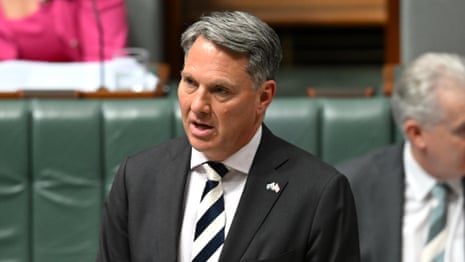The federal government will establish an independent inquiry into sexual violence in the Australian military and ensure serving personnel convicted of sex offences in either criminal or military courts face mandatory discharge.
Under its formal response to the Defence and Veterans’ Suicide royal commission, the government has agreed that sex offences including stalking and abusively distributing intimate images should result in automatic discharge, subject to appeal.
The government has also committed to establishing a new statutory body by September next year to oversee a system overhaul in Defence and Veterans’ Affairs aimed at preventing suicide within the defence and veterans’ community.
That body will also provide evidence-based advice, with an interim head to be appointed “as soon as possible”.
“My government will establish a new defence and veterans services commission, to undertake the most comprehensive reform to the culture, systems and processes across defence, the ADF, and the Department of Veterans’ Affairs to prevent suicide and improve the mental health and wellbeing of service personnel and veterans,” the prime minister, Anthony Albanese, told a press conference on Monday.
“The royal commission heard harrowing evidence about the cultural problems within the Australian Defence Force over time, and identified deficiencies with the approach, services and support of the Department of Veterans’ Affairs.”
Albanese said the government has “the deepest respect for every Australian who wears our nation’s uniform and serves selflessly to keep us safe”.
He said the government was determined to work to “keep them safe too”.
Personnel found to have engaged in sexual and related offences including harassment, unwanted touching and “prejudicial” or obscene conduct – whether through Defence’s disciplinary or administrative processes – will need to demonstrate why they, too, should not be discharged.
The measures are designed to be preventive as well as punitive, serving as a warning that any level of sexually inappropriate behaviour will have serious consequences.
Those facing mandatory discharge would be able to challenge the ruling in a formal process triggered by the conviction.
“Sexual misconduct and unacceptable behaviour have no place in Defence,” the government’s published response to the royal commission said.
“The rates of sexual violence being reported in the ADF are completely unacceptable.”
The government has vowed to work to change the defence culture to more actively encourage reporting of unacceptable behaviour.
There were few details available immediately as to how the foreshadowed independent inquiry into sexual misconduct in the ADF would operate or the power it would have. Some in government are suggesting the new statutory body may be tasked with undertaking it.
Of the royal commission’s 122 recommendations, the government has accepted 104 fully or in-principle.
It has rejected the commission’s recommendation to change the compensation system that now compensates injuries sustained on warlike operations at a higher rate than those sustained in training.
The royal commission recommended standardising the compensation rate based on the nature of injury, not the circumstances. But there was significant pushback in the veterans’ community and the government has opted to leave the current system in place. This part of a recommendation is the only proposal that has been rejected outright.
It is also not proceeding with aligning the Department of Veterans’ Affairs fee schedule with that of the National Disability Insurance Scheme, arguing more work needs to be done across government to ensure consistency on what is covered, as well as how much is paid.
In relation to sexual misconduct, agreed measures include ensuring the Australian Defence Force has a complete and reliable record of all serving personnel convicted in civilian courts of serious crimes and will record military convictions for sex-related offences in civilian criminal records.
The government will expressly require military tribunals to consider the impact on the victim of a sexual offence when sentencing an offender. Where an offender outranks a victim, this will be considered an aggravating factor potentially attracting a higher sentence.
Sentencing will involve victim impact statements, with their authors able to choose to read them aloud in open or closed court. It will also publish annual anonymised data on the outcomes of all incidents of sexual misconduct.
All changes relating to being forced out of the ADF for sexual and related offences will require legislation.
Among the 17 recommendations it has only “noted”, without promising action, is the proposal that future inspectors-general of the ADF should be civilians who have never served in the ADF. However, it has instructed the IGADF to immediately establish an inquiry into commanders’ abuse and weaponisation of the military justice system and it has agreed to establish a new Military Justice System Assurance Branch from next month, to better oversee the system’s operation.
There will be changes to new-recruit training to identify and address stress factors sooner and for career managers to better identify and respond to trauma.
The government has agreed to review its respite policies to help members returning from deployment to decompress and reintegrate and to do more to help defence families manage domestic postings.
It has also agreed to:
-
Publish better procedural fairness guidance those deciding on job classifications
-
More thoroughly consider the impact of mental health before recommending administrative termination
-
Trial a model outside the chain of command for supporting members involved in the military justice system
-
Directly address the risk factors for suicide and report on progress







